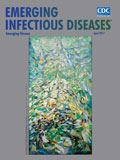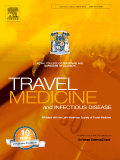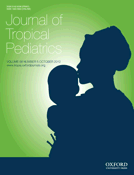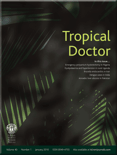
Tropical Medicine and Infectious Disease
Scope & Guideline
Elevating the discourse on tropical medicine and health.
Introduction
Aims and Scopes
- Epidemiology and Public Health:
Research focusing on the epidemiology of infectious diseases, their transmission dynamics, and public health implications in tropical regions. This includes studies on disease burden, risk factors, and the impact of environmental changes. - Neglected Tropical Diseases:
A strong emphasis on neglected tropical diseases (NTDs) such as schistosomiasis, leprosy, and lymphatic filariasis, including their epidemiology, clinical management, and strategies for control and elimination. - Emerging Infectious Diseases:
Investigation of new and re-emerging infectious diseases, including zoonotic infections, with studies focusing on their epidemiology, transmission, and control measures. - Clinical Research and Diagnostics:
Research that evaluates clinical outcomes, diagnostic methods, and treatment strategies for infectious diseases, especially in resource-limited settings. - Antimicrobial Resistance:
Studies addressing the patterns of antimicrobial resistance in tropical diseases, including the factors contributing to resistance and potential solutions for management. - One Health Approach:
Research incorporating the One Health concept, which recognizes the interconnectedness of human, animal, and environmental health, particularly in the context of zoonotic diseases.
Trending and Emerging
- Impact of Climate Change on Infectious Diseases:
An increasing emphasis on the effects of climate change on the transmission and epidemiology of infectious diseases, highlighting the need for adaptive public health strategies. - Syndemics and Co-Morbidities:
A rising trend in research examining the syndemic nature of diseases, particularly the interactions between infectious diseases and non-communicable diseases, such as diabetes and hypertension. - Digital Health and Telemedicine:
Emerging research focusing on the role of digital health technologies and telemedicine in improving access to care and disease management, particularly during the COVID-19 pandemic. - Vaccination Strategies and Hesitancy:
A growing body of work addressing vaccination strategies, acceptance, and hesitancy, particularly in the context of COVID-19 and other preventable tropical diseases. - Community Engagement in Health Interventions:
An increasing focus on community-based approaches and participatory research methodologies to enhance the effectiveness of health interventions and address local health needs.
Declining or Waning
- Traditional Vector Control Methods:
There appears to be a declining focus on traditional vector control methods, such as indoor residual spraying and chemical insecticides, possibly due to emerging resistance and a shift towards integrated vector management strategies. - Chronic Infectious Diseases:
Research related to chronic infectious diseases, such as leprosy and chronic hepatitis, has decreased, indicating a potential shift in focus towards acute infectious diseases and emerging threats. - Single-Agent Antimicrobial Treatments:
There is a waning interest in studies focusing solely on single-agent antimicrobial treatments, with a growing emphasis on combination therapies and alternative treatment strategies. - Basic Science of Infectious Disease Mechanisms:
Research focused solely on the basic science mechanisms of infectious diseases has seen a decline, as the journal emphasizes more on applied research and clinical outcomes. - Travel Medicine and Infectious Diseases:
The emphasis on travel-related infectious diseases appears to have decreased, potentially due to the impact of the COVID-19 pandemic on global travel and changing research priorities.
Similar Journals

TROPICAL BIOMEDICINE
Inspiring breakthroughs in parasitology and beyond.Tropical Biomedicine, published by the Malaysian Society of Parasitology and Tropical Medicine, is an influential journal dedicated to the field of infectious diseases and parasitology. Since its inception in 2005, the journal has aimed to advance scientific knowledge and foster research in tropical health, providing a vital platform for disseminating high-quality research findings, case studies, and reviews. With a Q3 ranking in Infectious Diseases and a Q4 in Parasitology for 2023, the journal plays an essential role in addressing the challenges faced in these fields, particularly in tropical and subtropical regions. Although currently not open access, its contributions are pivotal for researchers, healthcare professionals, and students dedicated to combating diseases prevalent in diverse ecological environments. By focusing on relevant topics and innovative approaches, Tropical Biomedicine seeks to enlighten and inspire the ongoing fight against tropical diseases, ultimately improving public health outcomes.

EMERGING INFECTIOUS DISEASES
Uncovering Insights to Combat Emerging Health ThreatsEmerging Infectious Diseases, published by the Centers for Disease Control and Prevention, is a leading open-access journal that has been dedicated to the field of epidemiology, infectious diseases, and medical microbiology since its inception in 1995. With an impressive impact factor placing it in the Q1 quartile rankings for multiple categories including Epidemiology, Infectious Diseases, and Medical Microbiology, this journal serves as a vital resource for researchers, practitioners, and students dedicated to combating the challenges posed by emerging infectious diseases. The journal's distinguished Scopus ranks further highlight its global influence, ranking #10 in Epidemiology, #26 in Infectious Diseases, and #13 in Medical Microbiology, all within the top percentiles. Accessible and targeted, Emerging Infectious Diseases publishes seminal research and reviews that contribute to the understanding and management of infectious diseases, ensuring that critical insights reach a broad audience. The journal encourages contributions that advance the scientific community’s knowledge and responses to public health challenges.

IJID Regions
Empowering communities with evidence-based health insights.IJID Regions is a pioneering open access journal published by Elsevier, focusing on the critical fields of epidemiology, infectious diseases, and public health. Established in 2021, the journal aims to provide a platform for disseminating high-quality, innovative research that addresses pressing health issues and informs evidence-based practices in communities around the globe. With its impact factors reflecting a Tier Q2 and Q3 ranking in various medical subcategories on the Scopus platform, IJID Regions is positioned as a valuable resource for researchers, health professionals, and policy-makers striving to enhance public health outcomes. This journal not only champions open access since its inception, promoting the free flow of information, but also welcomes contributions that shed light on contemporary challenges in environmental and occupational health. Its commitment to fostering dialogue and collaboration in the health sciences is paramount, making it an essential read for those engaged in advancing public health knowledge and initiatives.

Journal of Infection in Developing Countries
Transforming the landscape of infectious disease management.Journal of Infection in Developing Countries, published by J INFECTION DEVELOPING COUNTRIES, is a premier open-access journal dedicated to advancing research in the fields of infectious diseases, microbiology, parasitology, and virology, particularly within the context of developing nations. Established in 2007 and actively disseminating knowledge since 2008, this journal aims to bridge the gap between researchers and practitioners by providing a platform for high-quality, peer-reviewed articles that address the unique challenges faced in these regions. With an ISSN of 1972-2680 and a robust HIndex showcasing its growing influence, JIDC has attained a Q3 category ranking in several disciplines as of 2023, indicating its crucial role in shaping ongoing discourse in public health. As an open-access publication, it ensures that vital research is accessible to all, fostering collaboration and innovation in infectious disease management and control.

MEMORIAS DO INSTITUTO OSWALDO CRUZ
Connecting History and Modern Science in Public Health.MEMORIAS DO INSTITUTO OSWALDO CRUZ, published by the esteemed FUNDACO OSWALDO CRUZ in Brazil, serves as a vital platform for the dissemination of research in the fields of medicine and microbiology. With its inception dating back to 1909 as an open-access journal, it has made significant strides in promoting the understanding of health-related topics and infectious diseases across its diverse readership. This journal is recognized for its contribution to the scholarly community, boasting a Q2 category in Medicine (miscellaneous) and a Q3 rating in Microbiology (medical) as per the 2023 quartiles. Located in Rio de Janeiro, the journal not only embraces a rich historical context but also engages with contemporary issues in public health. Researchers and professionals in related fields will find valuable insights and data that underscore the significance of scientific collaboration in tackling global health challenges. With access to its archives spanning multiple decades, MEMORIAS DO INSTITUTO OSWALDO CRUZ remains a key resource for students and researchers alike as they endeavor to expand their knowledge and contribute to future innovations in health science.

Travel Medicine and Infectious Disease
Advancing global health through travel insights.Travel Medicine and Infectious Disease is a premier peer-reviewed journal published by Elsevier Science Ltd, dedicated to advancing the field of travel medicine and infectious disease research. With an impressive impact factor and a category ranking of Q1 in both Infectious Diseases and Public Health, Environmental and Occupational Health, this journal is recognized as a leading source of high-quality research and insights. Originating in 2003 and transitioning to an Open Access model in 2023, it aims to disseminate critical findings that enhance the understanding of health risks associated with travel, vaccination strategies, and infectious disease outbreaks. The journal’s Scopus rankings reflect its influence, with a rank of 7/665 in Public Health and 20/344 in Infectious Diseases. Researchers, healthcare professionals, and students will find this journal invaluable for staying informed on the latest trends and developments in travel-related health challenges.

JOURNAL OF TROPICAL PEDIATRICS
Exploring the frontiers of tropical child health.JOURNAL OF TROPICAL PEDIATRICS, published by Oxford University Press, stands as a critical platform for the dissemination of research and clinical advancements in the field of tropical pediatrics. With a rich history dating back to 1955, this journal serves as a significant contributor to our understanding of health issues affecting children in tropical and subtropical regions, focusing on infectious diseases, pediatric care, and child health. It currently holds an impressive Q2 ranking in three categories: Infectious Diseases, Medicine (miscellaneous), and Pediatrics, Perinatology and Child Health, placing it among the top journals in its field. Featuring both formative research and applied studies, the journal aims to address the unique challenges posed by pediatric care in tropical environments. Its inclusion in an esteemed database ensures a broad dissemination of critical knowledge to researchers, healthcare professionals, and students alike, promoting a collaborative approach to improving child health outcomes globally.

TROPICAL DOCTOR
Innovating public health strategies for developing regions.Tropical Doctor is a distinguished academic journal published by SAGE Publications Inc, specializing in the fields of infectious diseases and public health. With a history dating back to 1971, this journal serves as a crucial platform for disseminating research focused on the health challenges and requirements pertinent to tropical and developing regions. Though currently categorized in the fourth quartile in both Infectious Diseases and Public Health, Environmental and Occupational Health, it plays an essential role in fostering dialogue among researchers, health professionals, and policymakers. The journal provides insights into the prevention, treatment, and management of tropical diseases, thus bridging gaps in knowledge that are vital for improving health outcomes. While it does not offer open access, its rigorous peer-review process ensures that only high-quality research is published. As the global landscape of health continues to evolve, Tropical Doctor remains an important resource for those committed to addressing the pressing health issues in tropical regions.

ACTA TROPICA
Driving Discovery in the Tropics Since 1945ACTA TROPICA is a prestigious academic journal published by Elsevier, dedicated to advancing knowledge in the fields of Infectious Diseases, Insect Science, Parasitology, and Veterinary sciences. With an ISSN of 0001-706X and an E-ISSN of 1873-6254, it has established itself as a vital resource since its inception in 1945. The journal is recognized for its significant impact within the scientific community, boasting a Q2 ranking in Infectious Diseases and Parasitology, and a Q1 ranking in both Insect Science and Veterinary (miscellaneous) categories as of 2023. Specifically, it ranks #19 in Scopus for Parasitology and #129 for Infectious Diseases, underscoring its high visibility and relevance in these vital research arenas. ACTA TROPICA is a non-open access journal, ensuring high-quality peer-reviewed content that complements ongoing research and professional practices among scientists, researchers, and students. Explore groundbreaking studies and contribute to the ongoing dialogue within your field by selecting ACTA TROPICA as your next publication destination.

Research and Reports in Tropical Medicine
Connecting researchers for a healthier world.Research and Reports in Tropical Medicine is a distinguished open-access journal dedicated to advancing knowledge in the field of tropical medicine. Published by DOVE MEDICAL PRESS LTD, this journal operates under the ISSN 1179-7282, facilitating global access to quality research since its inception in 2010. With a commitment to disseminating innovative findings and critical analyses, the journal serves as a vital platform for researchers, professionals, and students engaged in the diverse aspects of tropical diseases and public health challenges. Research and Reports in Tropical Medicine welcomes original research articles, reviews, and case studies that contribute to an improved understanding of health issues in tropical regions, making it an essential resource for those aiming to impact global health positively.